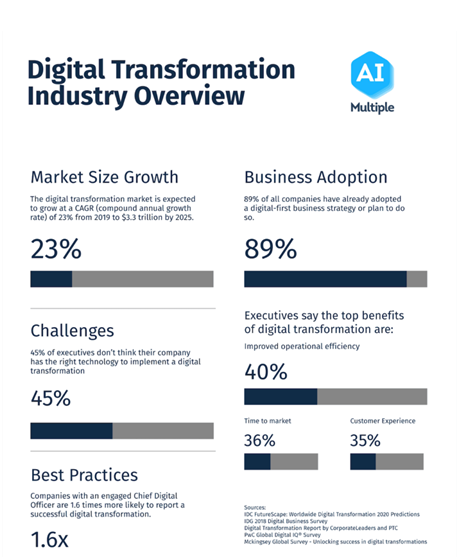6 Key Questions You Need To Ask Before Digitally Transforming Your Business

Digital transformations can be challenging as well as transitional for businesses.
Considering that digital transformation failures can range from 66% to 84%, businesses have to be prepared to face challenges and overcome them effectively. Digital transformation of your business is not a decision that you take overnight. More importantly, you should not do it just because your competitors are doing it. There are successful case studies of companies that have driven value through digital transformation such as Uber, Airbnb, and Yelp, but not all businesses achieve the same success.
Even before you set out to digitally transform your business, you should ask yourself: what is digital transformation, and do I need it? Once you have answers to these questions, you can proceed to ask more pertinent questions that can potentially affect the outcome of the digital transformation, such as follows:
1. Why is the transformation required for my business?
As is true for any major project that your business embarks on, it is important to set the end goals that you want to achieve through digital transformation. Setting goals is a great way to narrow down your primary priorities and how a digital transformation can play a role in achieving those priorities. digital transformations can affect all aspects of your business making it even more important to analyze if you are ready. Ask yourself what problems will you be able to solve through the digital transformation.
As a business owner, you should also assess why digital transformation seems to be the next step for your business. Are you looking to reduce costs? Or transform processes? Make workforce more efficient? If you are unable to find any reason, it is probably not the right time to go ahead with it.

2. How is it going to affect my processes and overall business?
What business owners often forget is that digital transformation is just as much of a business transformation as any other major business decision that you take. A comprehensive digital transformation can affect all your stakeholders including employees, as well as customers. Thus, it is important to list down the different kinds of impacts that digital transformations can have on your business – especially on your daily processes and operations.
Value creation is an important part of any digital transformation and as a business owner, you need to assess the value that will be generated through the digital transformation efforts that you are embarking on.
Digital transformations will inevitably affect all aspects of your business, which is why it is important for your to see if the changes brought on by the digital transformation will be worth it in the end.
3. What can I do to empower the digital transformation?
Digital transformation is a largely technological process and undoubtedly requires IT expertise. But even as the owner of a non-IT business, you have a major role to play in the digital transformation of your business. Such transformations require an adept leader who can guide and motivate the digital transformation process and drive it to fruition. Business leaders can enable the teams that are driving the transformation to do better, and also keep a check on the budget and the timelines.
Digital transformation can be a challenging processing spanning months or in some cases, even years. The onus of being patient and channeling motivation across the workforce falls on the fierce leader that heads the organization. Your experience and acumen as a business leader can be a great asset to the success of the digital transformation of your business.
4. Do I need additional tools or partners to accomplish this?
The sign of a true leader is not his ability to accomplish everything on his own. It lies in his ability to acknowledge and ask wherever they think they lack the expertise. As mentioned before, digital transformation is a largely IT-driven process and can involve several crucial and important decisions that require technological expertise. If you are the owner of a non-IT business and want to implement a digital transformation, it is a good idea to leverage digital transformation tools and partners.
You can hire a project manager who has vast experience in implementing digital transformations, have an IT team that monitors and moderates the technological decisions within the digital transformation, or purchase tools that can make it easier for you to implement digital transformation in your organization.
5. How are my teams going to collaborate and communicate?
Collaboration and communication are two processes that boost your business processes in every possible way. One of the major ways to accomplish this is through the implementation of processes and tools that can bolster communication and collaboration among your employees. Communication between teams can be vital in driving inter-departmental collaboration.
Furthermore, team collaboration could be a great way to drive your digital transformation and make sure that it is effective. Employees can help each other overcome challenges that can arise as a result of the transformation.

6. What are the main challenges that I should expect from transformation?
The challenges associated with digital transformation can affect all levels and departments of an organization. Digital transformation can also affect the customers of an organization making it even more important for organizations to assess possible challenges in advance. It is also important for organizations to consider the resources and processes that would be required to successfully mitigate challenges that arise from a company-wide digital transformation.
You should ask yourself questions such as – do we have enough resources to face the challenges? Do we have enough capacity to handle any possible negative impacts of the transformation? Seeking answers to these questions can ensure that organizations are able to cope with some of the major issues that arise from digital transformations.
Digitally transform your business
Digital transformations can make or break your business. If implemented properly, digital transformation can help you reduce costs and improve your organizational processes. However, if done incorrectly, it can result in losses for your business, as well as lower productivity among your team members. Asking yourself the aforementioned key questions can be crucial in setting goals and expectations for the transformation, and can thus provide you with metrics with which you can measure the success of your digital transformation.




